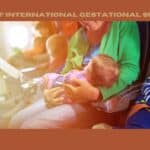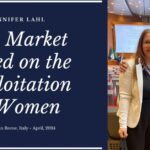
Let me begin by saying, I am not a luddite. I love technology, and the smaller the better. I love it when technology makes my life easier. Cell phones are grand–I can turn it on and off to fit my needs. Microwave ovens–LOVE them! The world wide web–I can waste hours and hours here. But sometimes we lose site of the role of technology, properly understood, to serve us. Our common societal goods and needs. To make life better, safer, easier, more efficient even. But within the field of biotechnologies I would argue, we need to pay real good attention of what we are after. What are we trying to accomplish? What we are asking for….because technology is not value free. It is not amoral. Or without consequences and unintended consequences. As we say in the trade, technology can bite back. Just this week, for instance, a Natalie Evans, in the U.K. who was left infertile because of her cancer treatment was denied the choice/right to use her frozen embryos to have a baby. Why? Because the male partner she was involved with at the time of the embryos were created, is no longer in her life. And he won the court battle, denying her the right to have these babies. Ms. Evans said, “I’m still as determined to do whatever it takes to have a child of my own.” Hmmmm. Whatever it takes? Be careful what you ask for.
Author Profile

- Jennifer Lahl, MA, BSN, RN, is founder and president of The Center for Bioethics and Culture Network. Lahl couples her 25 years of experience as a pediatric critical care nurse, a hospital administrator, and a senior-level nursing manager with a deep passion to speak for those who have no voice. Lahl’s writings have appeared in various publications including Cambridge University Press, the San Francisco Chronicle, the Dallas Morning News, and the American Journal of Bioethics. As a field expert, she is routinely interviewed on radio and television including ABC, CBS, PBS, and NPR. She is also called upon to speak alongside lawmakers and members of the scientific community, even being invited to speak to members of the European Parliament in Brussels to address issues of egg trafficking; she has three times addressed the United Nations during the Commission on the Status of Women on egg and womb trafficking.
Latest entries
 infertilityApril 23, 2024The Rise of International Gestational Surrogacy in the U.S.
infertilityApril 23, 2024The Rise of International Gestational Surrogacy in the U.S. Assisted Reproductive TechnologyApril 16, 2024Founder Jennifer Lahl’s Speech on Surrogacy to the Casablanca Declaration
Assisted Reproductive TechnologyApril 16, 2024Founder Jennifer Lahl’s Speech on Surrogacy to the Casablanca Declaration #BigFertilityFebruary 27, 2024No, Alabama Didn’t Ban IVF
#BigFertilityFebruary 27, 2024No, Alabama Didn’t Ban IVF ArticleSeptember 25, 2023The Little Engine That Could
ArticleSeptember 25, 2023The Little Engine That Could

